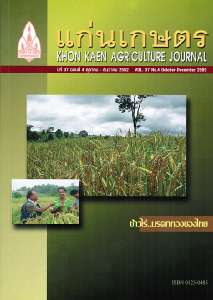Impacts of Adoption of Rice Combine Harvesters on the Economic and Social conditions of Farmers in Tung Kula Ronghai
Main Article Content
บทคัดย่อ
The Tung Kula Ronghai (TKR) area in Northeastern Thailand is widely believed to produce the best quality Hom Mali rice in the country and accounted for one-third of the 9.2 million ton of rice exported in 2007. Due to a growing labor shortage in recent years, adoption of combine harvesters has become widespread in the TKR. The objectives of this research were to study the impacts of adoption of combine harvesters on the Hom Mali rice agroecosystem in the TKR and describe the coping strategies farmers employ to cope with those impacts, in order to better understand the socio-economic impacts of combine harvesters in the TKR. It was found that socio-economic impacts on rice farmers due to the use of combine harvesters include 1) an increase of 30.3 % in net benefits compared to manual harvesting, and 28 % of migrant labor can continue working in the city.


